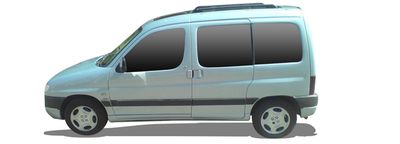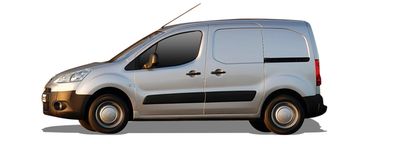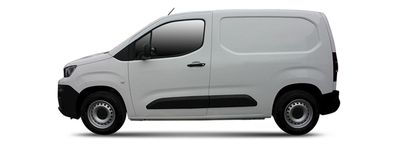Table of Contents
Peugeot Partner engines
Since its launch in 1996, the Peugeot Partner has established itself as a versatile high-roof estate and commercial vehicle with a wide range of Peugeot Partner engines. Over three generations, the range of engines has developed from simple naturally aspirated engines to modern turbo and electric drives. The technological evolution reflects both the progress made by the PSA Group and the increasing demands for efficiency and environmental compatibility.

Peugeot Partner Generation I (1996-2008)

The first Peugeot Partner generation was characterized by robust but technically simple engines that were primarily designed for reliability and low operating costs. Mileage varied greatly: while the tried-and-tested 1.9 diesel engines easily reached 400,000 to 500,000 kilometers with proper maintenance, the petrol engines often required major repairs between 200,000 and 300,000 kilometers. Typical maintenance intervals were between 15,000 and 20,000 kilometers, whereby the diesel engines required significantly less maintenance. The absolute top engine of this generation was the 1.9 D with 71 hp, which impressed with its indestructibility and low fuel consumption. Technical innovations were rare, but the focus was on simplicity and ease of repair - a concept that gave the Partner a strong position in the commercial vehicle market.
Peugeot Partner petrol engines: Generation I (1996-2008)
The Peugeot Partner petrol engine range mainly comprised naturally aspirated engines from the TU series. The 1.1 TU1 with 60 hp served as the entry-level engine, followed by the 1.4 TU3 with 75 hp and the 1.6 TU5 with 90 hp. These Peugeot Partner engines were characterized by their simplicity, but suffered from typical problems of older petrol engines: ignition coil defects, idling problems and increased oil consumption at higher mileages. The 1.6 16V with 110 hp was the most powerful petrol engine and offered better running characteristics, but was prone to valve problems and required more maintenance. The early catalytic converter versions in particular showed weaknesses in the longevity of the lambda sensors.
Peugeot Partner diesel engines: Generation I (1996-2008)
Peugeot Partner diesels were dominated by the legendary 1.9 D (XUD9) with 69-71 hp, which proved to be one of the most reliable engines of its time. This indirect-injection diesel was practically indestructible and regularly achieved mileages of over 500,000 kilometers. The 1.9 TD with 90 hp offered more power thanks to turbocharging, but was more susceptible to turbocharger damage. From 2002, the more modern 2.0 HDI with 90 hp was added, which was significantly cleaner and quieter with common-rail injection and a particulate filter, but also more complex to maintain. The Peugeot Partner 1.9 D developed into a cult engine for frequent drivers and business people - its robustness and low fuel consumption of only 5.5-6.0 liters made it the first choice for cost-optimized drivers.
| Peugeot Partner engine | Power output | Fuel consumption | Typical weaknesses | Rating |
|---|---|---|---|---|
| 1.1 TU1 | 60 HP | 6.8-7.5 l/100km | Ignition coils, weak performance | Average |
| 1.4 TU3 | 75 HP | 6.5-7.2 l/100km | Idle problems, oil consumption | Good |
| 1.6 TU5 | 90 HP | 6.8-7.8 l/100km | Valve problems, lambda sensors | Average |
| 1,6 16V | 110 HP | 7.2-8.0 l/100km | Valve clearance, high-maintenance | Moderate |
| 1,9 D | 69-71 HP | 5.5-6.0 l/100km | Practically none | Very good |
| 1.9 TD | 90 HP | 6.0-6.5 l/100km | Turbocharger damage | Good |
| 2.0 HDI | 90 HP | 5.8-6.2 l/100km | Particle filter, injection nozzles | Good |

Peugeot Partner Generation II (2008-2018)

The second Peugeot Partner generation marked the transition to modern engine technology with turbocharging and advanced injection technology. Reliability remained at a high level, with most engines reaching 300,000 to 400,000 kilometers with proper maintenance. Major repairs were typically due between 180,000 and 250,000 kilometers, mainly due to more complex exhaust aftertreatment. The absolute highlight was the 1.6 HDI with 92 hp, which perfectly embodied Peugeot's experience with diesel technology. Technical highlights of this generation were the introduction of the stop-start system, improved noise insulation and automatic transmission available for the first time. In the commercial vehicle market, the Partner was able to further expand its position as a cost-effective and reliable van.
Peugeot Partner petrol engines: Generation II (2008-2018)
The Peugeot Partner petrol engine range was completely revised and now included modern VTi engines. The 1.4 VTi with 95 hp served as the entry-level engine and offered significantly better running characteristics than its predecessor. The 1.6 VTi with 120 hp was the most powerful petrol engine and was characterized by low maintenance costs. These Peugeot Partner engines showed significantly fewer problems than the previous generation, but occasionally there were difficulties with the ignition coils and the throttle valve. The 1.6 THP with 150 hp was only offered in sporty variants and was prone to turbocharger problems with negligent maintenance. The 1.4 VTi in particular proved to be a reliable all-rounder with moderate fuel consumption.
Peugeot Partner diesel engines: Generation II (2008-2018)
The Peugeot Partner 1.6 HDI dominated the diesel range with various power levels from 75 to 120 hp. All variants had common-rail injection and met at least the Euro 4 standard. The 1.6 HDI with 92 hp became the bestseller and offered the best combination of performance, consumption and reliability. Problems were mainly encountered with exhaust gas aftertreatment: Particulate filter blockages on short journeys and occasional defects in the injection nozzles. The more powerful 1.6 HDI with 120 hp was sportier, but also more susceptible to turbocharger damage. All Peugeot Partner HDI engines were characterized by low fuel consumption of 4.5-5.5 liters and easily achieved a range of over 1,000 kilometers on freeway journeys.
| Peugeot Partner engine | Power output | Fuel consumption | Typical weaknesses | Rating |
|---|---|---|---|---|
| 1.4 VTi | 95 HP | 6.2-6.8 l/100km | Ignition coils, throttle valve | Good |
| 1.6 VTi | 120 HP | 6.5-7.2 l/100km | Occasional valve problems | Good |
| 1.6 THP | 150 HP | 7.0-7.8 l/100km | Turbocharger damage | Moderate |
| 1.6 HDI | 75 HP | 4.3-4.8 l/100km | Particle filter for short journeys | Good |
| 1.6 HDI | 92 HP | 4.5-5.0 l/100km | Very robust, occasional injection nozzles | Very good |
| 1.6 HDI | 120 HP | 4.8-5.3 l/100km | Turbocharger damage, particulate filter | Good |

Peugeot Partner Generation III (2018-today)

The current Peugeot Partner generation represents the most modern stage of development with complete electrification of the drive range. All engines meet at least the Euro 6d Temp standard and offer advanced technologies such as SCR catalytic converters and AdBlue injection. With proper maintenance, most engines reach 250,000 to 350,000 kilometers, with the 1.5 BlueHDI diesels being considered particularly durable. Major repairs are typically due between 150,000 and 200,000 kilometers, mainly due to the complex exhaust gas aftertreatment. The absolute top-of-the-range engine is the 1.5 BlueHDI with 130 hp, which optimally combines performance, efficiency and reliability. Technical highlights include the introduction of the all-electric e-Partner, 8-speed automatic transmission and comprehensive connectivity solutions. In the market, the Partner is positioning itself as the technology leader in the compact commercial vehicle segment.
Peugeot Partner petrol engines: Generation III (2018-today)
The Peugeot Partner petrol engine range has been converted to modern PureTech engines. The 1.2 PureTech with 110 hp forms the basis and offers a good balance between performance and consumption thanks to its three-cylinder turbo technology. The 1.2 PureTech with 130 hp is the most powerful petrol version and features additional technologies such as variable valve control. These Peugeot Partner engines exhibit typical problems of modern downsized engines: coking of the intake valves, occasional turbocharger weaknesses and increased demands on oil quality. The 1.2 PureTech with 110 hp has proven to be more reliable and is developing into the best gasoline engine of this generation. Maintenance intervals are around 20,000 kilometers, whereby the use of long-life oil is mandatory.
Peugeot Partner diesel engines: Generation III (2018-today)
The Peugeot Partner 1.5 BlueHDI forms the backbone of the diesel range with power levels from 100 to 130 hp. All variants have SCR catalytic converters with AdBlue injection and meet the Euro 6d Temp standard. The 1.5 BlueHDI with 100 hp is the most economical engine with a fuel consumption of just 4.2-4.6 liters, while the 130 hp engine offers more power for towing. These Peugeot Partner engines are considered very reliable, but occasionally show problems with the AdBlue system and the particulate filter on frequent short journeys. The 1.5 BlueHDI with 130 hp is becoming a favorite for commercial users and achieves a real consumption of less than 5 liters when driving on the freeway. The maintenance intervals have been extended to 30,000 kilometers.
Peugeot Partner electric drive: Generation III (2018-today)
The Peugeot e-Partner offers a system output of 136 hp and a range of up to 275 kilometers (WLTP). The electric motor develops its maximum torque of 260 Nm immediately, offering a very lively driving experience. The 50 kWh battery can be charged at fast-charging stations with up to 100 kW. Problems are rare so far, mainly limited to software updates and occasional charging errors. The e-Partner is establishing itself as a pioneer in the electric commercial vehicle segment and offers the lowest operating costs for city driving.
| Peugeot Partner engine | Power output | Fuel consumption | Typical weaknesses | Rating |
|---|---|---|---|---|
| 1.2 PureTech | 110 HP | 5.8-6.4 l/100km | Valve coking, turbocharger | Good |
| 1.2 PureTech | 130 HP | 6.0-6.6 l/100km | Turbocharger, oil quality critical | Average |
| 1.5 BlueHDI | 100 HP | 4.2-4.6 l/100km | AdBlue system, particulate filter | Good |
| 1.5 BlueHDI | 130 HP | 4.4-4.8 l/100km | Very robust, occasional AdBlue | Very good |
| Electric | 136 HP | 21-24 kWh/100km | Software, rare charging errors | Good |

Conclusion: The best Peugeot Partner engines of all generations
The development of Peugeot Partner engines shows a continuous improvement in terms of efficiency and environmental compatibility, while reliability has remained at a consistently high level. The diesel engines in particular have established themselves as the benchmark for longevity and low operating costs across all generations. The new electrification opens up additional possibilities for environmentally conscious users without neglecting the proven virtues of the Partner.
- Best Peugeot Partner gasoline engine:
The 1.2 PureTech (110 hp, Generation III) combines modern turbo technology with acceptable reliability and good fuel consumption for a petrol engine.
- Best Peugeot Partner diesel engine:
The 1.5 BlueHDI (130 hp, Generation III) offers the best combination of performance, efficiency and modern exhaust technology, while the legendary 1.9 D (Generation I) remains an indestructible classic.
- Best Peugeot Partner electric drive:
The e-Partner (136 hp, Generation III) with its range of 275 km and fast charging options is ideal for commercial city driving and environmentally conscious private users.
For maintenance and spare parts for all Peugeot Partner generations, AUTODOC offers a comprehensive range of original and quality spare parts with fast delivery and expert advice.















